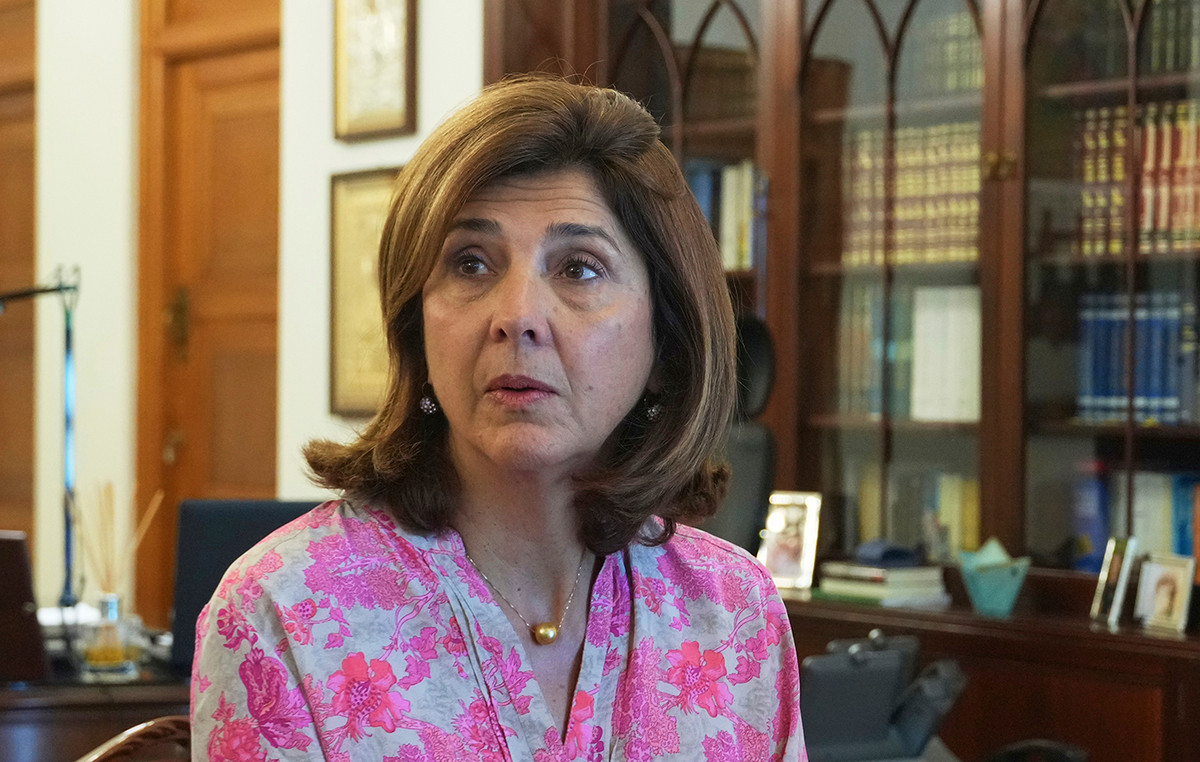Of Eleftheria Kourtali
The tightening of the European Central Bank’s monetary policy must now be considered certain, with the first rate hike coming in July, before a series of raises that will bring interest rates in the Eurozone to positive ground for the first time since 2014. The spike in inflation does not leave much room for Frankfurt to follow in the footsteps of a number of other central banks internationally, led by the US Fed, which has already entered the “game” of austerity, with a significant further impact on equities and bonds.
According to analysts, the rise in inflation means that bond pressures are expected to continue, further “hitting” stock valuations, which have fallen significantly since the beginning of the year, so the rise in ECB interest rates seemed another possible Yes, but a more distant “bet”. The energy crisis, supply chain shortages and rising money costs, as a result of the duration of the war and the spread of the pandemic, overshadow any other developments for the markets, they note.
Signal for raising interest rates
Lagarde’s statements last week, which followed a barrage of statements by ECB officials, gave the strongest signal that monetary policy normalization was accelerating. “My expectation is that they will be completed at the beginning of the third quarter,” Lagarde said, referring to bond markets, at a conference in the Slovenian capital. “The first rate hike, in line with the ECB’s interest rate policy, will take place shortly after the end of net asset purchases and could mean a period of only a few weeks,” he added.
Frank Elderson, a member of the ECB’s Governing Council, also said that the ECB might consider raising interest rates in July, while Bundesbank President Joachim Nagel estimated that the ECB would stop buying bonds at the end of June. said it would support raising interest rates in July. ECB Vice President Luis de Guidos changed his rhetoric in a matter of days, noting last week that the ECB needed to normalize its policy “sooner rather than later”, and only on May 1 had said that interest rates were “probably” will not increase in July.
Isabel Schnabel, a member of the Governing Council of the ECB, stressed that by addressing the risks quickly and decisively, monetary policy can ensure price stability in the medium term, thus avoiding the much higher financial cost of long overdue action.
And these are just some of the statements made by a number of ECB officials, who, following the resurgence of Eurozone inflation to 7.5% last month, say that the tightening of monetary policy will be implemented within the third quarter. Inflation in Germany in April was already 7.4% and high over 40 years, while a jump to 8.3% was recorded in US inflation last month.
Morgan Stanley estimates that inflation in the Eurozone will move higher and will remain high for a longer period of time. “There are clear signs that inflationary pressures are widening and inflation will peak at around 8.3% in early autumn, with an annual average of 7.3% for 2022,” he said. Next year is expected to slow gradually, but will remain above the ECB’s target of 2%, with an annual average of 3.8%, with the dominant driving force in the services sector by the end of the year.
Analysts are now confident that the ECB will raise interest rates in July, with a number of investment banks expecting further increases in 2022. HSBC estimates that they will increase by 25 basis points, with further increases to follow in the September meetings. December and March 2023, before the tightening cycle closes. Increase by 25 bp. Morgan Stanley also expects a second in July and a second in September, with the ECB zeroing interest rates this year before moving on to two further increases in 2023.
“We expect the ECB to complete its QE in June and raise its deposit rate by 25 basis points in July, September and December. “Normalization of the policy, clearer indications of more significant inflationary impacts could require a faster exit,” notes Goldman Sachs.
The consequences
Rising money costs are raising strong concerns about countries’ borrowing costs, with analysts highlighting concerns about a possible new crisis in the Eurozone. Deutsche Bank has warned that if interest rates rise sharply over a longer period of time, we may well face a Euro 2 crisis.
The sell-off in bonds has sent yields to multi-year highs, while it has hit international stock markets hard, with analysts talking about a bear market in the US, as fears of stagnant inflation intensify.
As Petros Steriotis, a senior CIF executive, points out, Eurozone government and corporate bonds are in the midst of one of the worst sell-offs of all time, as the ECB has signaled its intention to raise its deposit rate to positive ground for for the first time since 2014 and end bond purchases. Rising money costs and developments in secondary bond markets are raising strong concerns about the cost of public borrowing and possible corporate bankruptcies. At the level of a Greek ten-year bond, the yield has risen to post-pandemic high, which implies a vertical increase in the risk premium and discount rates on cash flows and dividends of shares, with all that implies for the ATHEX General Index ., which is now nearing a six-week low.
“Fears of a slowdown in GDP, aggressive central banks plus rising real yields and political uncertainty will remain short-lived, further pushing up stock valuations and causing negative earnings revisions,” said Generali Investments.
The current concern about the slowdown in the global economy with inflation rising at the same time has forced the markets to decline and has led to a significant increase in bond yields across the curve, as commented by Nikos Kafkas, head of Depolas’ analysis department. Investment Services. The General Index, he adds, is rapidly approaching critical equilibrium points in the medium term, while the success of counteracting the decline will also depend on the international environment. According to Mr. Kafkas, some securities are already appearing with attractive valuations, but we must not forget that the prospects lead the market mainly.
Tightening of economic conditions
As Citi has pointed out, loose monetary policy, especially QE, has inflated all financial markets, and now that quantitative easing has receded, real returns are rising and risk assets, such as stocks, are falling. The relationship with the global QE suggests that real yields could move even higher, which would be negative for stocks, and thus they would remain vulnerable to further de-rating. According to Citi estimates, the aggressive monetary policy that is being followed now indicates a further downgrade of the MSCI World benchmark, with the P / E falling from 15x to 14x. MSCI USA will see the de-rating reduce its P / E from 18x to 16x. The de-rating of the world index MSC Growth at 17x, from the current 22x, will be the most painful.
Having already recorded double-digit losses this year, investors need to prepare for more, as it becomes increasingly certain that the Fed intends to tighten economic conditions to tackle inflation. Essentially, financial conditions measure how easily households and businesses can access credit, thus showing how monetary policy is transmitted to the economy.
And they have an impact on future growth: Goldman Sachs estimates that a 100 basis point tightening in its Financial Conditions Index (FCI) – which takes into account interest rates, credit and equity levels as well as the dollar – limits growth by a percentage. unit next year.
Goldman and other indicators from the Fed of Chicago and the IMF show that financial conditions have tightened significantly this year, but remain historically loose, evidence of the scale of incentives provided to help economies cope with the pandemic.
Goldman Sachs economists estimate that the bank’s financial condition in the US should “tighten” a bit further in order for the Fed to achieve a “smooth landing” in the economy, that is, to slow down growth, but not too much. The Goldman FCI index in the US is at 99 points – 200 bp below the beginning of the year and at the “tighter” levels since July 2020.
In this context, BlackRock last week reduced the risk in its portfolio. A shock to commodity prices – which will hit growth, especially in Europe and emerging markets, which are importers of goods – and a slowdown in growth in China are worsening the outlook for the economy, with little chance of a perfect economic scenario. low inflation and growth, he notes. The recent sell-off of the markets shows that investors are adapting to this reality, he adds.
“Investors between Scylla and Charybdis”
The increase in the cost of money and the change in policy given by the largest economy in the world will push the other central banks to sooner or later follow the same pace, estimates Loukas Papaioannou, economist of Fast Finance. The US 10-year high has approached the highs of November 2019, with 3.6% being the boiling point above which small and medium-sized US companies will begin to have a serious problem in servicing their debt, as he emphasizes. In addition, raising funds will become more difficult and investors have already become cautious, demanding higher returns.
“The bitch of rising money costs through the end of the quantitative easing and zero interest rates policies that have fed the central banks for so many years is waiting for its victims on one side of the Strait. Opposite is the Charybdis of high inflation and low growth. “fed by the unstable geopolitical conditions, but also the over 10 years of addiction of economies to the devaluation of raw materials and food, the reduction of investments in productive sectors and low dollar policies, is now waiting to devour the fools”, the economist notes characteristically.
Investors should be prepared for further stock volatility amid significant movements in key economic variables and bond markets, UBS notes, and continues to recommend market-based placements that perform better in a highly inflationary environment.
These include “value” shares, he points out. Shares with relatively low valuations (value) tend to benefit from the increase in real interest rates. He notes that since 1975, “value” stocks have outperformed “growth” stocks throughout the cycle in periods when inflation was 3% or higher. Thus, the Swiss bank maintains that investors who have reduced their exposure to equity after a long period of underperformance should add long-term positions to equity or value-oriented sectors and markets, including global energy and the United Kingdom.
At the same time, UBS reiterates that commodities have historically performed well during periods of high inflation and are among the very few assets that have shown positive returns since the beginning of this year.
Source: Capital
I am Sophia william, author of World Stock Market. I have a degree in journalism from the University of Missouri and I have worked as a reporter for several news websites. I have a passion for writing and informing people about the latest news and events happening in the world. I strive to be accurate and unbiased in my reporting, and I hope to provide readers with valuable information that they can use to make informed decisions.







